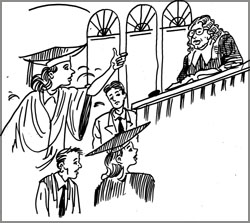|
observer |
|
|
|
|
|
OTHER LINKS |

|

|

|
GCE A/L English Literature - Made Easy - Drama : The Merchant of Venice - by William ShakespeareCommentary: Act 4 Sc 1 The "dramatic high point" of the play is revealed in Scene I Act 4. The "bond reaching its crisis and its resolution" Shylock faces defeat and Antonio is released emphasising the happy ending of Shakespeare's comedy. The speeches by the Duke and Antonio keep the audience informed of the contrasting positions of the two opponents. The Duke of Venice calling Shylock "an inhuman wretch" Antonio sees him as a villain. Antonio's character rouses sympathy.
The "solitary character" of Shylock is structured in such a manner so as to rouse "dramatic sympathy". Shylock is a lonely figure surrounded by his enemies and his own daughter deceiving him, annoying him and ruining him by running away with a Christian, with all her father's wealth. There's suspense reigning as to whether Shylock will really "demand Antonio's life" According to Shylock he "stands upon the law" and the creator's of the law, themselves requesting Shylock to break the law. It is the law of the Venetians that he has "sworn to have the due and forfeit of bond" Shylock's character reveals clearly that he has no intention or motive regarding what is right and what is wrong - what is justifiable or what deal with injustice. These are Shylock's weaker and inhuman aspects. His ambition and desire to destroy a man, a Christian who he says has spat upon him in public. Antonio is aware that mercy is something unobtainable from Shylock, a jew who demands "justice". But to the Shakespearean audience it is clearly indicated that "Shylock's inhumanity" and his extreme desire for revenge "the pound of flesh - and nothing else. There's excitement when Nerissa (the lawyer's clerk) presents the letter from Bellario. As the Duke reads out the letter and Shylock sharpening his knife gives a tint of "melodramatic touch" to the drama presenting Shylock as a person bereft of humanity, a jew in a Christian community, Shylock feels that he has triumphed. Shakespeare has sustained tension" by making Portia "question the legality" of the bond and Antonio agreeing to the bond. The speech made by Portia stressing the importance of mercy. As she studies the conditions of the bond she spots a flaw, while Shylock is adamant that he stands by the bond - A pound of flesh from Antonio's body nearest to his heart Portia knows that Shylock's knife won't get a fraction of a chance to touch Antonio's body though the audience is ignorant of it. Thus the "tension of the scene" is maintained. Portia leads Shylock slowly into a problem which he is unable to solve or get over. Shakespeare makes Portia to reveal "the interpretations of absolute justice." Thus inviting the sympathy of the audience, Antonio's dignified personality is portrayed in his last speech. His love for Bassanio as a true friend requesting him not to be sad but "you cannot better be employed Bassanio than to live still and write mine epitaph" Shakespeare maintains the trend of comedy through a strain of tragic situations springing up. The disguised Portia and Nerissa would not be happy to see their husbands exchange words dealing with "ready sacrifice of lives for one another". As Shylock approaches Antonio with his knife raised to cut off the pound of flesh and Portia's "pronouncement" "no jot of blood" shocking shylock for he sees the symptoms of losing the case and that his case is now almost "irrevocably reversed" Shylock who was triumphed (as he thought) seems to be in a different position, he, himself being threatened. Death awaits him. He's given only a small chance to comment "upon the judgement passed upon him." Being a Jew, defeated in a Venetian Court of Law and could he contrive to become a Christian. Ultimately he begs his judges, "I pray you give me leave to go from hence. I am not well. Send the deed after me and I will sign it". This is "master stroke of simple under stated pathos" (Cliff Notes) The audience is able to visualize HATE getting defeated (through Shylock's behaviour pattern) Shakespeare has highlighted the results of hatred and how villainous motives get defeated emphasising that "the rule of Law" is an essential factor. ACT 4 Scene I is the central scene of the drama. The interpretations of Shylock, Conflict between mercy and justice" and Shylock losing his only daughter, his valuables, his property and above all his religion. Thus Shylock becomes a "figure of Pathos". To the Elizebethan audience Shylock seemed a villain of the "romantic comedy" deserving punishment. Lorenzo and Jessica become the owners of Shylock's wealth. Shylock becomes the Symbol of hatred. Justice reigns as the wealth of Shylock goes to his daughter, Jessica and "the courtjudgement that Shylock should become a Christian, detested by Shylock but would have pleased the Elizebethan audience for giving a chance to Shylock to "achieve salvation". The pity and sadness that prevailed change into a romantic comedy with Shylock's exit. The conflicts, unpleasant proceedings, pathetic atmosphere fade off, paving way for an atmosphere of "Love and Concord" Shylock's exit is one of the "most puzzling moments of the Shakespearian stage". |











